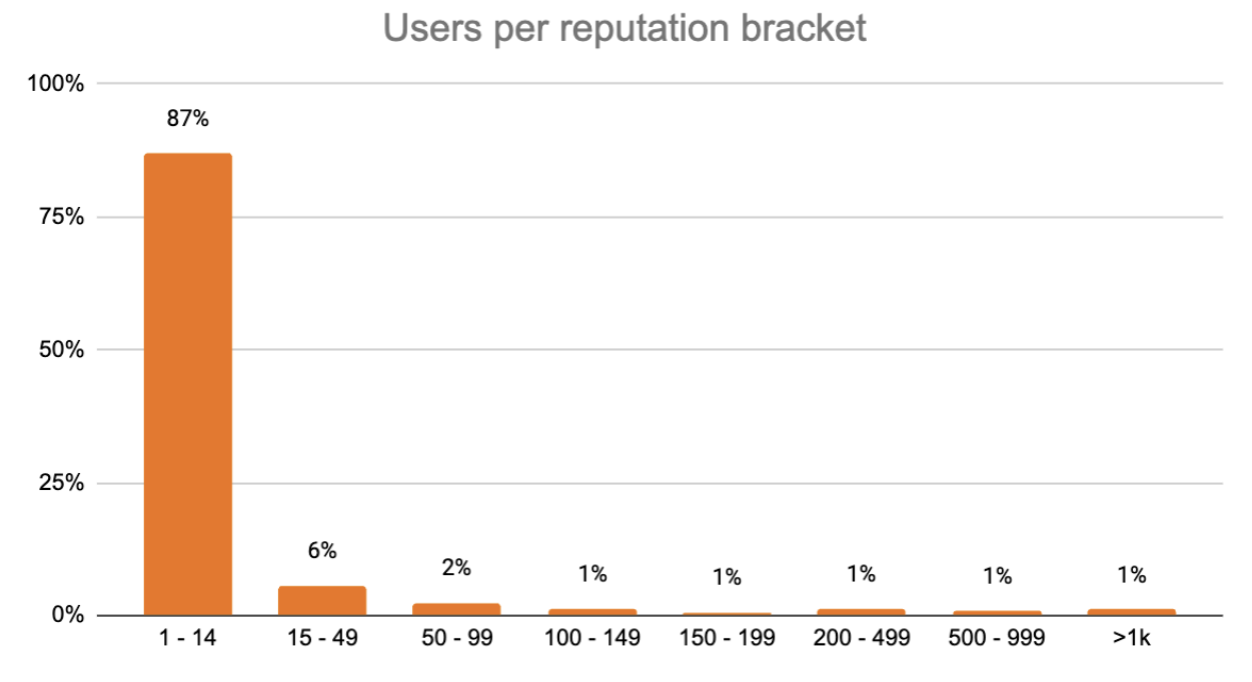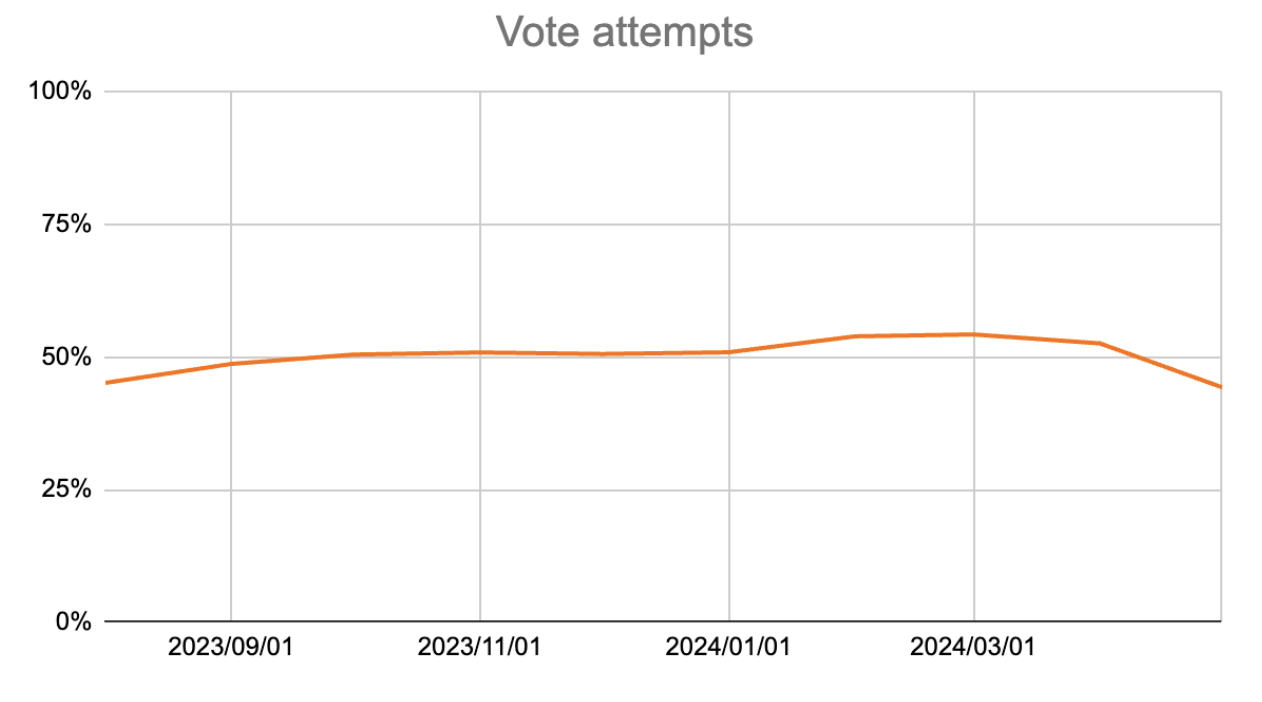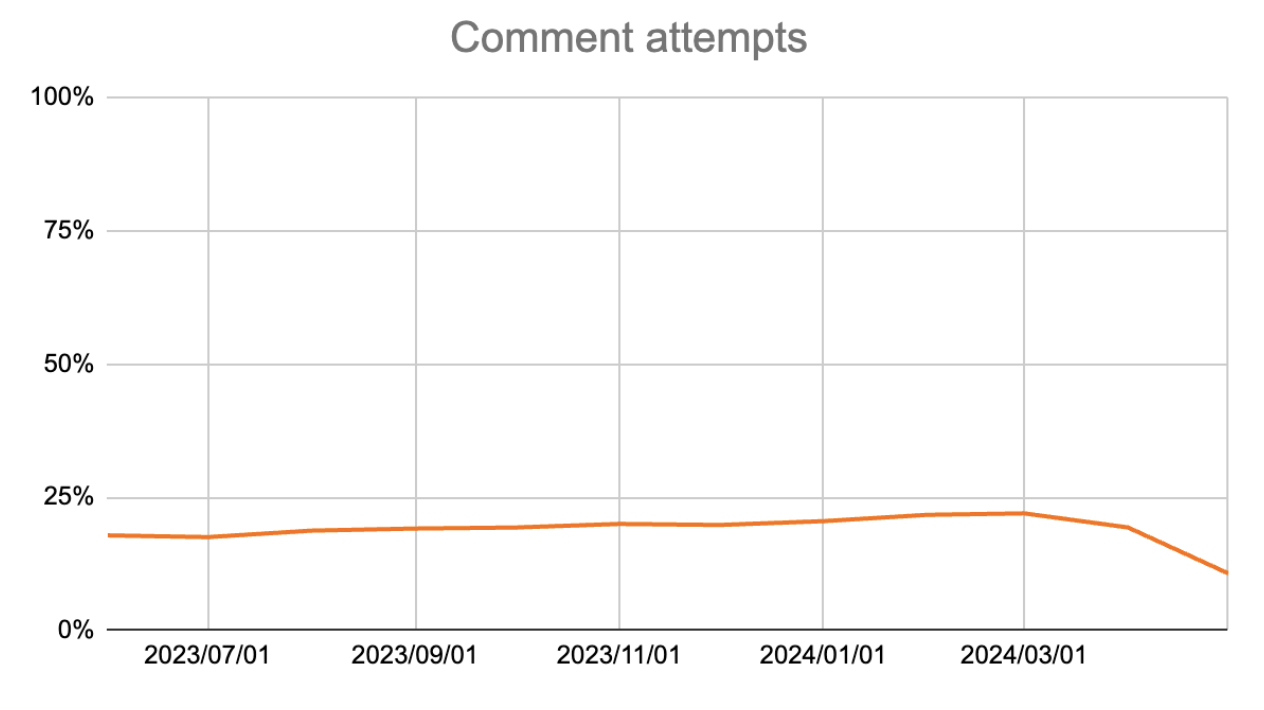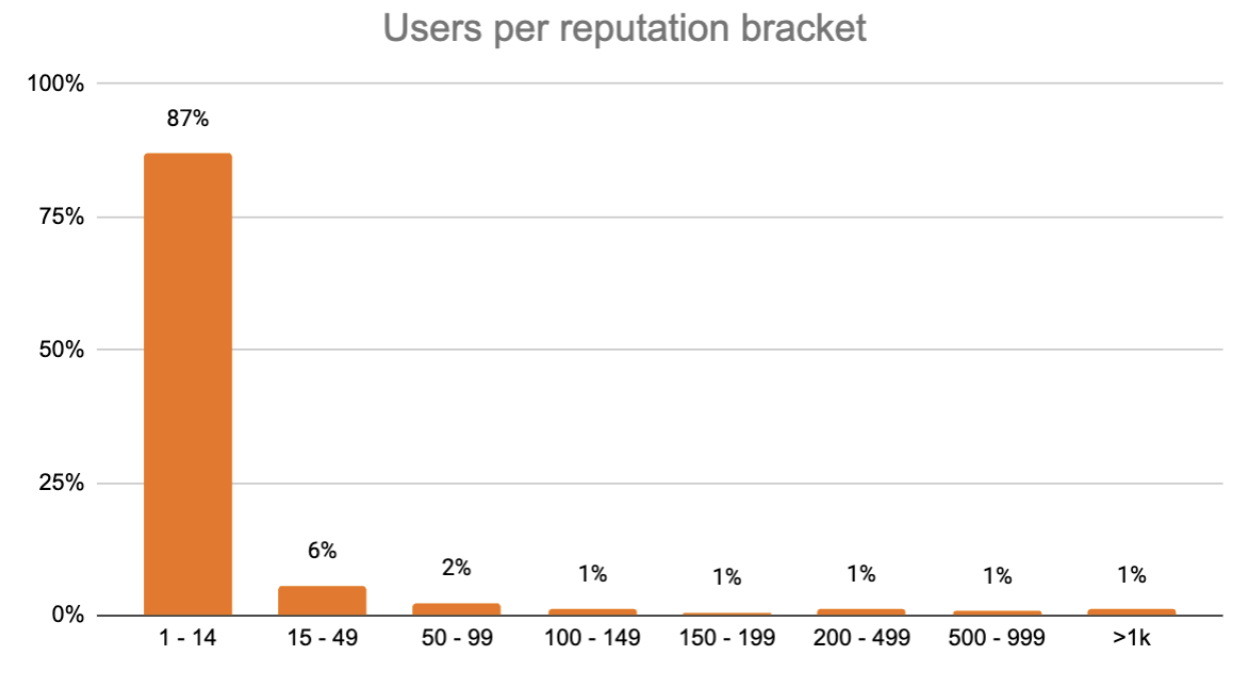I absolutely agree that users are trying to participate in many ways but can't, which is why I've championed the idea of moving away from the reputation system as a method to award privileges. Over the years I've learned that users want to edit more freely, review posts, chat, etc...
One reason I'm glad to know y'all are working on improving search is that it's another place where users have indicated the are struggling to participate. Users have often talked about how they rely on Google to find anything on SO because finding an answer to their specific question in the millions of posts is so frustrating. As a result, they often ask questions that have already been answered because it's easier for them to ask a new question rather than find an existing one.
While Staging Ground is a good start and I hope to see continued work there and on the question asking process, I'd also love to see a better answer writing flow for first-time answerers and people who have had struggled writing good answers previously. I can't overstate the value of "just in time" user guidance - where we build in help as a user is trying to use a tool, rather than trying to pre-inform them about something they're not trying to do (and may never do).
Most frequently, we all know that users want to vote and comment - likely in much higher volumes than any other privilege. This is understandable - the mental barrier to vote or comment is likely significantly lower than the one to ask, answer, or edit for many people. Besides in your vote and comment attempt data, we can see this in the huge number of answers moderators and reviewers on SO delete every day that are attempts to comment or show appreciation.
Unfortunately, the risks within the current system of allowing everyone with an account to vote and comment are high and addressing them is a complex Gordian knot that can't simply be cut through because it happens to be holding up the Sword of Damocles, so it's reasonable to look for other places to focus.
User personalization and privileges
As to the next steps you've listed - I understand personalization is a big thing right now across the internet and can be an effective way to increase sign-ups. Just look at the boom the days after Dark Mode was introduced on SO. Control over homepage content is one of the consistent ways users have asked for more personalization, so I understand why that's something you're investigating and, since tags would be the most obvious ways for users to restrict what shows up on their personalized homepage... I can understand why that's part of it.
That said, while SO's volume is so huge that users customizing the home page isn't likely to impact moderation and may improve it, I'd encourage you to investigate the risks for smaller sites where the homepage is a de facto review queue. For example, if many of the active users customize their homepage and don't check the full feed, visibility of low quality content could drop and leave more closing to fewer users - particularly moderators.
This may mean it's even more important to consider visibility of moderation tools for users who have privileges - whether they use them or not. There are absolutely under-utilized tools that could use a visibility boost but I do request that you do so in the interest of discoverability and ease of access, rather than pressing users to do things they're not interested in doing. In my experience, users have a relatively limited list of activities they're willing to do and most people with any given privilege have no interest in that aspect of the site.
The review queue indicator is a case study in frustration and sorrow that ended in a fizzle that still needs to be "fixed". It's annoying to people who have no interest in reviewing while simultaneously under- and over-notifying users who are interested in reviewing, leading to many reviews aging away or taking a long time to be attended to. Happy to recommend some posts to review if you are interested.
Deep dive into voting data on SO
Assuming I'm reading your third chart correctly, you're indicating that if you combine all votes and all vote attempts, the latter makes up about half of the total, potentially doubling the number of votes cast. Assuming that many people don't even bother to try voting because they know they can't, those numbers are probably lower than they could be, indicating a huge opportunity for engagement.
Looking at the data on Feedback attempts VS Votes
Using a couple of public SEDE queries Jon Ericson wrote for an answer last year, I looked at the vote and vote attempt history for Stack Overflow. One of the queries looks at votes by type per day on any given site; the other looks at feedback by type per day on a site.
Because I couldn't get the queries on a single graph, I pulled the CSV for each and moved it into Google Sheets. I also shortened the window to start in 2021 to get a view of more recent history. As a note, there are elements in this result that lead to questions about whether it's measuring what I think it does, so if you're able to share your info or confirm this is correct (or at least the same data y'all are using), that'd be helpful.
Here's what that looks like (Stack Overflow between January 2021 and today) - the faint lines are centered, moving average trend lines for each:
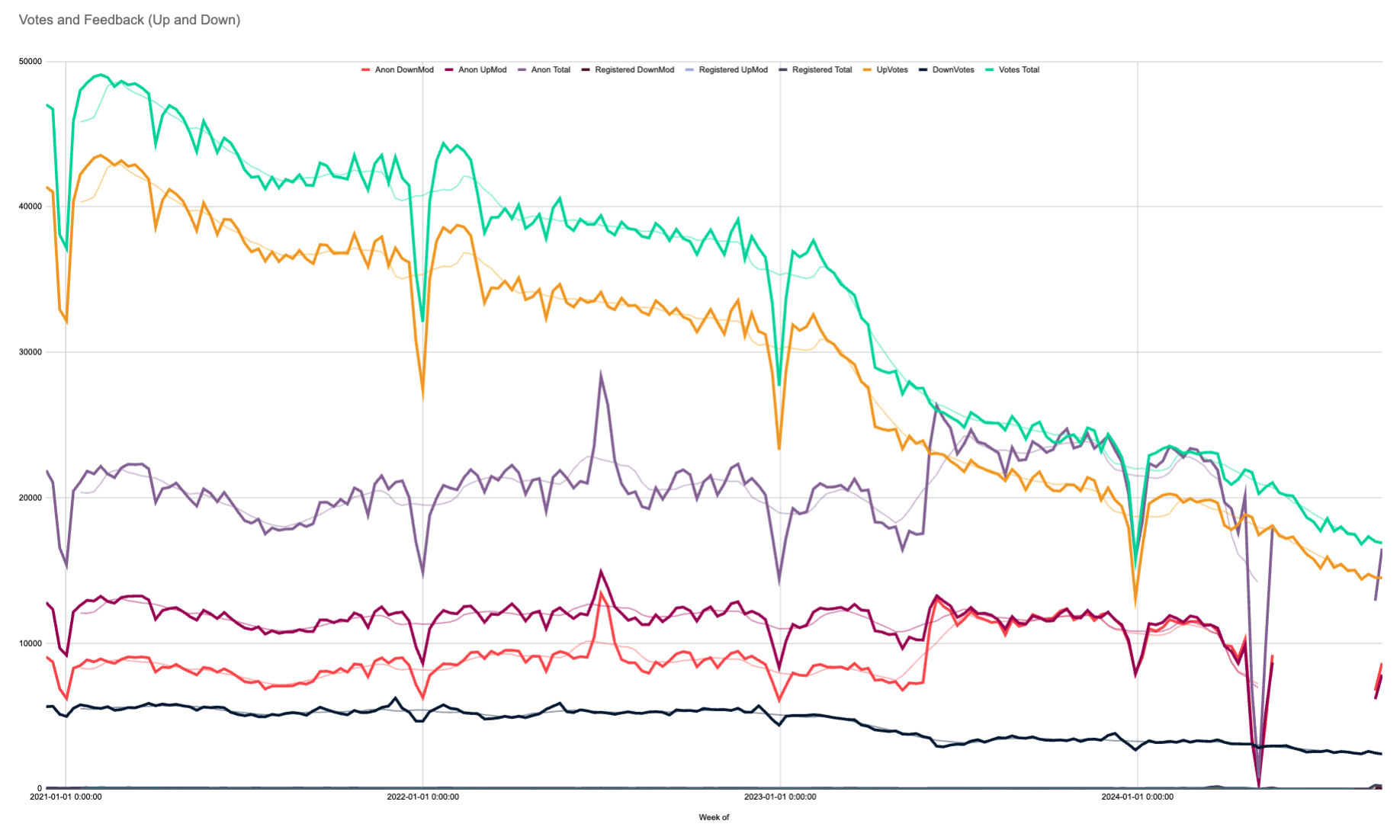
As the chart above shows, while registered vote attempts are practically non-existent (assuming the data is correct), unregistered vote attempts have been about equal to actual votes as of June 2023, though before that, they were quite a bit lower. This was a bit confusing to me since the question is about "activation" (getting signed-up users to participate) but the numbers I'm seeing in SEDE that align with your chart represent users who are not logged in. Hopefully you can share data that shows the correct numbers for registered, low rep users.
Since the registered user vote attempt count in SEDE is so small compared to the others, I'll include the a chart of it on its own.

There are a couple of questions that these charts elicit that the one in the question doesn't -
- Why has there been such a drastic reduction in votes from users who have the privilege, despite the stability of unregistered votes?
- Does this change represent a smaller number of users casting votes? fewer votes/day per user? both?
- Why was there such a huge jump in downvote attempts from unregistered users in June 2023?
- This appears to be the related to the vote button styling changes. The test for this change was held in June 2022, coinciding with the jump there, too, including the change having an outsized impact on downvotes.§
- Why are there so few feedback attempts from registered users? Is there a bug in the way the data is collected and/or de-duplicated or do they just not try to vote because they know they can't - or something else?
There's one last thing I thought I'd draw attention to - the percentage of votes by user type, which I did by dividing the upvotes by total votes for each user type.

Questions this chart leads me to asking include
- Why do unregistered users attempt to downvote at a rate that's nearly split 50-50 between up and down while registered users primarily upvote?
- Is the "cost" to downvote answers part of it?
- Does being anonymous lead users to try to vote down more frequently?
- Why did both unprivileged groups see a reduced percentage of upvotes in mid 2023 (and was it really related to the vote button update)?
I'd love to have some insight into these questions and many others. In your post, you say:
Activation is the gap between sign-up and engagement. It’s where we (and most platforms) see the biggest drop-off. We see this as the biggest opportunity for improving user retention.
Considering the platform has lost more votes per week over the last few years than there are vote attempts per week from unregistered users, I don't really think you're correct. I think the biggest opportunity for user retention is retaining (and getting back) the once-engaged users you've already lost by understanding why they left or reduced their engagement on the site.
Now, sure, there are millions of never-"activated" users out there, why should you chase after the significantly smaller number of people who left? - because the odds are probably still better. 100% of the people who left were previously "activated" to some degree. What percentage of visitors have even attempted to vote or comment, let alone tried to participate regularly? I don't know if that's even quantifiable but the general community industry wisdom I've read is that it's close to 5-10%.
What counts as "activation"?
When I see definitions of "activated" and "engaged" referring to community products - particularly Stack Exchange - that imply "activation" is key to users finding value in the product and that activated/engaged users can't be "passive visitors", I'm concerned ‡. A book that isn't checked out of the library may still be read by people in the library. If you're trying to justify investing in the library, you can't only consider easily-countable things like check-outs. The goal has to be finding ways to identify passive use and showing it has value - though, if you can solve that, community managers everywhere would love to know your findings.
While giving passive users ways to participate that make finding information or customizing their views easier is great, I wouldn't expect it to go any further than that - and I don't know that y'all have any data that shows it does. For example, of users who created accounts when Dark Mode was released, is their engagement with the platform significantly different than users who created accounts at other times?
That said, active users who create, curate and vote on content are absolutely necessary to the success of the platform, and there aren't nearly enough of them. I'd argue that if the goal is to have a sustainable platform full of high-quality content, you should be looking to "activate" users who show they have interest in tasks that need more engagement and use just-in-time guidance to lead them through it without getting in their way more than necessary to get them up to speed.
I don't think that attempts to vote (or even comment, for that matter) on their own should be considered indications of an "activated" or "engaged" user or that a user is ripe to become "activated". I also believe many engaged users never vote or comment. As such, only citing voting and comment attempts as support for the general hypothesis that "users are trying to participate but can't" leaves out a lot of engagement while also overstating the potential benefit to the site. †
Conclusion
I appreciate that y'all are focusing on features for registered users. Make the site easier to use and customize in ways that people are telling you they want; remove barriers to participation and ensure easy access to all features, particularly those that are under-utilized or forgotten. Feel free to look for better ways to solve existing problems or even remove complexity that isn't doing what it was designed to achieve or is no longer necessary but ensure you fully understand why things work they way they do as the obvious reason for complexity is rarely the only reason.
Additionally, understand why people are reducing or stopping their engagement. Are there things that can be changed to draw them back or prevent others from leaving? Someone who leaves because they're tired of waiting for a ill-functioning system to be improved may return once it's fixed. Newly "activated" users won't be interested in all aspects of the platform, so may not necessarily replace the users who left. Prioritize "activation" efforts to areas of the site that need the most help.
If reputation is truly the barrier, look towards trying to understand alternatives. In an era when rep was easy to get, it was an easily-surmountable barrier for most users to reduce problematic behavior on the site. Rep is no longer easy to get, so it has become an insurmountable barrier for many users. While you can't just dump it, and there likely won't be an "easy" solution, we don't have to accept the status quo as the only way but the risk of problematic behavior is still there, if not greater.
Find good solutions to the privileges problem, not the easy ones.
Footnote:
§ - There is an increase in upvotes but it is difficult to identify whether that's due to a short-term downturn in anonymous voting in April and May of 2023, as the weekly vote counts in late 2023 are consistent with historical voting from this group. The increase in unregistered up and down votes during the test in 2022 appears to encompass all of the "net 28% increase in overall votes" reported when the change went live in 2023, as there's no similar jump in actual votes. That said, the first half of 2023 showed an increase in voting decline by privileged users. While there wasn't an increase in votes for those users, the decline slowed somewhat, though it's not possible to draw any conclusions about why.
‡ - "Why 95% Of Your Community Visitors Don’t Participate (And What You Should Do About It!)" is an article from Feverbee - a community consultancy and training company - that makes some really great points about "lurkers" - who they prefer to call "learners", which I think applies to this situation really well. In it, they share that most lurkers don't participate more often because they don't feel like they have anything to contribute and that onboarding messages don't work while efforts to pressure them into participating more frequently usually end up backfiring.
† - For reference, see the issues that plagued Interpersonal Skills SE for the first year of launch due to "drive-by" votes, comments, and answers from users with the association bonus who had no interest in sticking around to participate otherwise.
